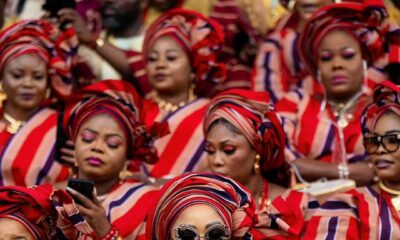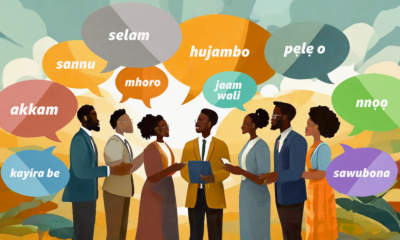Features
Adebayo Adegbembo: Mastering Native Languages
 I heard a knock on my desk and looked up to find Femi staring down at me. He had a worried look on his face and I noticed the sweat forming on his forehead. “Anything the matter?” I asked shutting the lid of my laptop. He shook his head and simply motioned me to the boardroom for some privacy. With the door shut, I quickly ran through some routine work-related questions. Had he deleted a source file, footage or forgotten to save a weeklong work?
I heard a knock on my desk and looked up to find Femi staring down at me. He had a worried look on his face and I noticed the sweat forming on his forehead. “Anything the matter?” I asked shutting the lid of my laptop. He shook his head and simply motioned me to the boardroom for some privacy. With the door shut, I quickly ran through some routine work-related questions. Had he deleted a source file, footage or forgotten to save a weeklong work?
“No, no, no”, he responded. “So, what could be worse than those?” I continued somewhat relieved. He smiled and pointed me in the direction of the reception area where three men were seated. The tripods and cameras gave them away as reporters. “These are not the regulars”, Femi added. They were from a popular program on African Magic Yoruba TV channel and had come to interview us. The interview was to be conducted in Yoruba language. That’s when it became obvious what was happening. Femi, originally tasked with the role was passing the baton to me.
At first, being interviewed in Yoruba language for a TV program didn’t seem like a challenge. Instead, it presented an opportunity to directly market our Yoruba101 app to a core Yoruba audience. I told Femi I’d do it and he went on to introduce me to the media crew. When the interview commenced, my confidence lasted only as far as the first few question. I found myself answering questions with a fusion of English and Yoruba. No matter how much I tried, I just couldn’t make consecutive statements without mixing up words from both languages. The director wouldn’t have it. He kept cutting short the interview while the presenter corrected me on the Yoruba terminologies to use for some expressions. Understandably, these phrases did not form part of my daily communication in Yoruba, hence my struggle. Frustrated at some point, I attempted to appropriate some words by Yorubanizing them. I used terms like iPadi for the iPad and tabileti for tablet. The presenter chuckled on many occasions. For Smartphone, I coined phrases like ero abanisoro alagbari. The presenter, director and cameraman broke into a loud laughter. I joined in knowing this wasn’t getting any easier. Long story short, we pulled through the interview in what seemed like forever.
Afterwards, the experience got me thinking of how rich our native languages are. Even though I communicate regularly in Yoruba, the interview exposed a layer of the language that I hadn’t been exposed to; a familiarization with Yoruba terminologies in different sectors. In contrast to my struggle, the presenter demonstrated how well equipped some native language speakers are.
On deeper thoughts, I realized attaining proficiency in a native language isn’t even rocket science. When compared to English, Yoruba or any other native language can be mastered. It requires conscious efforts and extensive reading.
Think of how you’ve come to express yourselves in English with little hassle. English presents itself in many forms to most of us everyday. My English vocabulary is constantly growing subconsciously with the Dictionary app word-of-the-day notifications, books, music, movies among other stuffs I consume in English regularly. The same context if applied to our native languages would no doubt improve my knowledge. Also, I suspect any avid listener or watcher of Yoruba programs would fair better in a similar situation. It made me realize how much native languages cannot be treated in isolation. The same approach is what leads to mastery.
While the motivation to attain any level of mastery in native languages is relative, my point is that it’s doable. In fact, I doubt if any native language scholar at the University level wouldn’t have to go that route towards attaining a degree.
We may well live with the fact that some of us will be content with knowing enough of our native languages to communicate. That’s fine but with the foregoing, there are indeed routes to mastery of these native languages if we chose to go further.
Photo Credit: Dreamstime






















